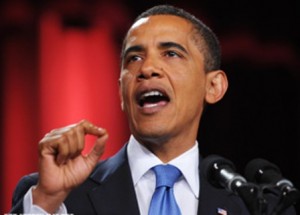Only Lewis Carroll could have done justice to the Obama administration’s fall down the dark hole into the U.S.’ latest Middle East misadventures.
Beginning with his Cairo and Istanbul speeches in the spring of 2009, President Obama attempted, indeed, “a new beginning,” as speechwriter Thomas E. Donilon, now, significantly, national security adviser, labeled them. Were it not so tragic, analogies to Carroll’s masterpiece would describe the situation that ensued: whether Iranian Mad Hatters screaming “Off with their heads!” or an obsequious American mainstream media’s Humpty Dumpty defining meanings for words at their whim.

In an appeal to Arab-Muslim intellectuals as well as Islam’s politicians, the President morphed its long history of intolerance and aggression into a paean of praise. The fables of Arab custodianship of enlightenment when Europe was in the Dark Ages were trotted out. The morbid contemporary history of abuse of women, intellectual obscurantism, cheapening of life, barbaric legal codes, child marriage and endogamy, corrupt economic practices at every level, in contemporary Muslim societies were all ignored. Flattery was the order of the day: Mr. Obama even alluded to important Islamic contribution to the American ethos, something no one yet even among the most chauvinistic Muslims had attempted.
A superficial glance at the United Nations Arab Human Development Report 2002 – facts and opinions so obvious accumulated despite that twisted organization — would have refuted Mr. Obama’s underlying assumptions and his remedies for exorcism of the region’s problems.
Instead, Mr. Obama made apology for real and perceived past American failings his order of the day.
Historians will argue forever over the contribution this Obama Doctrine made to the already intolerable chaos the region had been heading into for decades.
But it becomes clearer by the moment, American policy over the past four years has further exacerbated peace and stability in the region, world peace, and above all, American security:
- Mr. Obama and his advisers fed the irrationality of Mideast debate not only by denouncing earlier strategies but by impugning U.S. motives.
- Mr. Obama and his advisers adopted Muslim “victimization”, viewing Israeli-Arab relations as the be all and end all of Mideast problems.
- Mr. Obama and his advisers prioritized Israeli settlements, ignoring the concomitant role of a large Israeli Arab minority in any two-state fix.
- Mr. Obama and his advisers trivialized U.S. sacrifices, refusing personal intervention to save status of forces negotiations for an Iraq alliance.
- Mr. Obama and his advisers attempted to appease Iran’s mullahs ignoring their 17 years of secret pursuit of mass destruction weapons.
- Mr Obama and his advisers trashed Poland and Czech Republic’s anti- missile effort enhancing Teheran’s threat to Israel, Europe and the U.S.
- Mr. Obama and his advisers played revolutionary politics, abandoning longtime allies and rationalizing Moslem Brotherhood’s jihad history.
- Mr. Obam and his advisers dallied over the Syrian imbroglio, “leading from behind”, as competing forces radicalized drawing in neighbors.
- Mr. Obama and his advisers ignored the obvious 9/11 anniversary threat in anarchic Libya and Egypt, helping bring on death and defeat.
- Mr. Obama and his advisers’ contradictory statements demonstrated confusion, obfuscating obvious continued well-planned terrorism.
Most of all, of course, the Obama administration continues to belittle the U.S. role of superior force as a main determinant of international relations, the ultimate strength of any diplomatic effort.
There will be no easy road back to even marginal stability in the Mideast, of course, not least given the inability and cowardice of its political class to move into the modern era.
But while the overwhelmingly Arab economic and social problems remain, the nature of the Teheran regime and its pursuit of dominance of the region through acquisition of weapons of mass destruction must remain Washington’s paramount concern. Suggestions from the usual suspects that some sort of compromise might be achieved, allowing Teheran nuclear weapons capability in exchange for Iran’s voluntary halt short of weaponization, only threaten further catastrophe.
Past Iranian performance cannot lend credibility to such an arrangement.
When American policymakers again pick up the ball, whether this president or Mr. Mitt Romney, a publicly proclaimed red line for Iran backed by sincere mobilization of all resources is the only U.S. policy that can begin Mideast stabilization. That decision awaits, obviously, with even more horrendous events in the offing if such policy reversal is not undertaken — and quickly.
Sol W. Sanders, (solsanders@cox.net), writes the ‘Follow the Money’ column for The Washington Times on the convergence of international politics, business and economics. He is also a contributing editor for WorldTribune.com and East-Asia-Intel.com.

